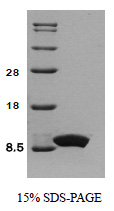Interleukin-8 / IL8 (78 aa) Human Protein
Other products for "CXCL8"
Specifications
| Product Data | |
| Species | Human |
| Expression Host | E. coli |
| Expression cDNA Clone or AA Sequence |
MAVLPRSAKE LRCQCIKTYS KPFHPKFIKE LRVIESGPHC ANTEIIVKLS DGRELCLDPK ENWVQRVVEK FLKRAENS
|
| Predicted MW | 9 kDa |
| Concentration | lot specific |
| Purity | >95% by SDS-PAGE |
| Presentation | Purified |
| Buffer | Presentation State: Purified State: Liquid purified protein Buffer System: Phosphate buffer saline (pH 7.4) |
| Endotoxin | < 1.0 EU per 1ug of protein (determined by LAL method) |
| Preparation | Liquid purified protein |
| Protein Description | Recombinant Human Interleukin-8 / IL-8, aa 23-99 was expressed in E.coli and purified by using conventional chromatography techniques. |
| Storage | Store undiluted at 2-8°C for one month or (in aliquots) at -20°C for longer. Avoid repeated freezing and thawing. |
| Stability | Shelf life: one year from despatch. |
| Reference Data | |
| RefSeq | NP_000575 |
| Locus ID | 3576 |
| UniProt ID | P10145, A0A024RDA5 |
| Cytogenetics | 4q13.3 |
| Synonyms | GCP-1; GCP1; IL8; LECT; LUCT; LYNAP; MDNCF; MONAP; NAF; NAP-1; NAP1; SCYB8 |
| Summary | The protein encoded by this gene is a member of the CXC chemokine family and is a major mediator of the inflammatory response. The encoded protein is commonly referred to as interleukin-8 (IL-8). IL-8 is secreted by mononuclear macrophages, neutrophils, eosinophils, T lymphocytes, epithelial cells, and fibroblasts. It functions as a chemotactic factor by guiding the neutrophils to the site of infection. Bacterial and viral products rapidly induce IL-8 expression. IL-8 also participates with other cytokines in the proinflammatory signaling cascade and plays a role in systemic inflammatory response syndrome (SIRS). This gene is believed to play a role in the pathogenesis of the lower respiratory tract infection bronchiolitis, a common respiratory tract disease caused by the respiratory syncytial virus (RSV). The overproduction of this proinflammatory protein is thought to cause the lung inflammation associated with csytic fibrosis. This proinflammatory protein is also suspected of playing a role in coronary artery disease and endothelial dysfunction. This protein is also secreted by tumor cells and promotes tumor migration, invasion, angiogenesis and metastasis. This chemokine is also a potent angiogenic factor. The binding of IL-8 to one of its receptors (IL-8RB/CXCR2) increases the permeability of blood vessels and increasing levels of IL-8 are positively correlated with increased severity of multiple disease outcomes (eg, sepsis). This gene and other members of the CXC chemokine gene family form a gene cluster in a region of chromosome 4q. [provided by RefSeq, May 2020] |
| Protein Families | Druggable Genome, Secreted Protein, Transmembrane |
| Protein Pathways | Bladder cancer, Chemokine signaling pathway, Cytokine-cytokine receptor interaction, Epithelial cell signaling in Helicobacter pylori infection, NOD-like receptor signaling pathway, Pathways in cancer, RIG-I-like receptor signaling pathway, Toll-like receptor signaling pathway |
Documents
| FAQs |
| SDS |
Resources
Recombinant Protein Resources |
{0} Product Review(s)
0 Product Review(s)
Submit review
Be the first one to submit a review
Product Citations
*Delivery time may vary from web posted schedule. Occasional delays may occur due to unforeseen
complexities in the preparation of your product. International customers may expect an additional 1-2 weeks
in shipping.






























































































































































































































































 Germany
Germany
 Japan
Japan
 United Kingdom
United Kingdom
 China
China
